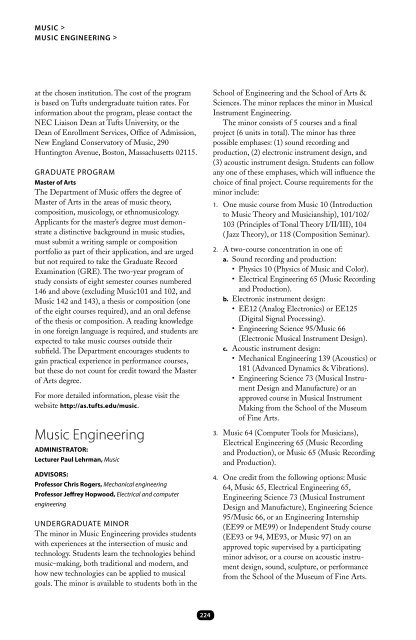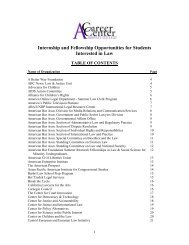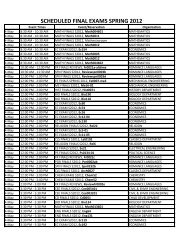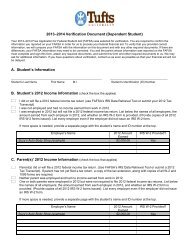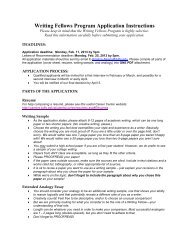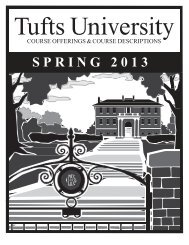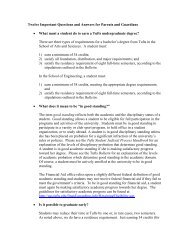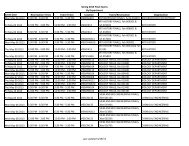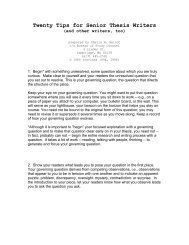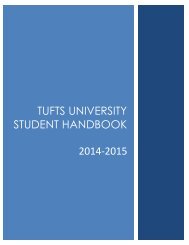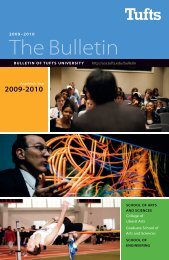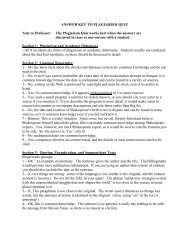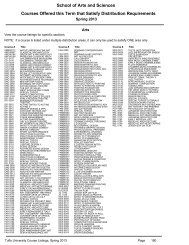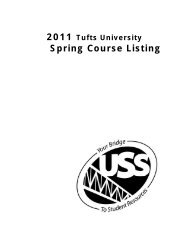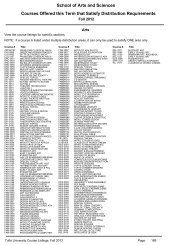2013â2014 The Bulletin - USS at Tufts - Tufts University
2013â2014 The Bulletin - USS at Tufts - Tufts University
2013â2014 The Bulletin - USS at Tufts - Tufts University
Create successful ePaper yourself
Turn your PDF publications into a flip-book with our unique Google optimized e-Paper software.
Music ><br />
Music Engineering ><br />
<strong>at</strong> the chosen institution. <strong>The</strong> cost of the program<br />
is based on <strong>Tufts</strong> undergradu<strong>at</strong>e tuition r<strong>at</strong>es. For<br />
inform<strong>at</strong>ion about the program, please contact the<br />
NEC Liaison Dean <strong>at</strong> <strong>Tufts</strong> <strong>University</strong>, or the<br />
Dean of Enrollment Services, Office of Admission,<br />
New England Conserv<strong>at</strong>ory of Music, 290<br />
Huntington Avenue, Boston, Massachusetts 02115.<br />
GRADUATE ProgrAM<br />
Master of Arts<br />
<strong>The</strong> Department of Music offers the degree of<br />
Master of Arts in the areas of music theory,<br />
composition, musicology, or ethnomusicology.<br />
Applicants for the master’s degree must demonstr<strong>at</strong>e<br />
a distinctive background in music studies,<br />
must submit a writing sample or composition<br />
portfolio as part of their applic<strong>at</strong>ion, and are urged<br />
but not required to take the Gradu<strong>at</strong>e Record<br />
Examin<strong>at</strong>ion (GRE). <strong>The</strong> two-year program of<br />
study consists of eight semester courses numbered<br />
146 and above (excluding Music101 and 102, and<br />
Music 142 and 143), a thesis or composition (one<br />
of the eight courses required), and an oral defense<br />
of the thesis or composition. A reading knowledge<br />
in one foreign language is required, and students are<br />
expected to take music courses outside their<br />
subfield. <strong>The</strong> Department encourages students to<br />
gain practical experience in performance courses,<br />
but these do not count for credit toward the Master<br />
of Arts degree.<br />
For more detailed inform<strong>at</strong>ion, please visit the<br />
website http://as.tufts.edu/music.<br />
Music Engineering<br />
Administr<strong>at</strong>or:<br />
Lecturer Paul Lehrman, Music<br />
ADVISORS:<br />
Professor Chris Rogers, Mechanical engineering<br />
Professor Jeffrey Hopwood, Electrical and computer<br />
engineering<br />
UNDERGRADUATE MINOR<br />
<strong>The</strong> minor in Music Engineering provides students<br />
with experiences <strong>at</strong> the intersection of music and<br />
technology. Students learn the technologies behind<br />
music-making, both traditional and modern, and<br />
how new technologies can be applied to musical<br />
goals. <strong>The</strong> minor is available to students both in the<br />
School of Engineering and the School of Arts &<br />
Sciences. <strong>The</strong> minor replaces the minor in Musical<br />
Instrument Engineering.<br />
<strong>The</strong> minor consists of 5 courses and a final<br />
project (6 units in total). <strong>The</strong> minor has three<br />
possible emphases: (1) sound recording and<br />
production, (2) electronic instrument design, and<br />
(3) acoustic instrument design. Students can follow<br />
any one of these emphases, which will influence the<br />
choice of final project. Course requirements for the<br />
minor include:<br />
1. One music course from Music 10 (Introduction<br />
to Music <strong>The</strong>ory and Musicianship), 101/102/<br />
103 (Principles of Tonal <strong>The</strong>ory I/II/III), 104<br />
( Jazz <strong>The</strong>ory), or 118 (Composition Seminar).<br />
2. A two-course concentr<strong>at</strong>ion in one of:<br />
a. Sound recording and production:<br />
• Physics 10 (Physics of Music and Color).<br />
• Electrical Engineering 65 (Music Recording<br />
and Production).<br />
b. Electronic instrument design:<br />
• EE12 (Analog Electronics) or EE125<br />
(Digital Signal Processing).<br />
• Engineering Science 95/Music 66<br />
(Electronic Musical Instrument Design).<br />
c. Acoustic instrument design:<br />
• Mechanical Engineering 139 (Acoustics) or<br />
181 (Advanced Dynamics & Vibr<strong>at</strong>ions).<br />
• Engineering Science 73 (Musical Instrument<br />
Design and Manufacture) or an<br />
approved course in Musical Instrument<br />
Making from the School of the Museum<br />
of Fine Arts.<br />
3. Music 64 (Computer Tools for Musicians),<br />
Electrical Engineering 65 (Music Recording<br />
and Production), or Music 65 (Music Recording<br />
and Production).<br />
4. One credit from the following options: Music<br />
64, Music 65, Electrical Engineering 65,<br />
Engineering Science 73 (Musical Instrument<br />
Design and Manufacture), Engineering Science<br />
95/Music 66, or an Engineering Internship<br />
(EE99 or ME99) or Independent Study course<br />
(EE93 or 94, ME93, or Music 97) on an<br />
approved topic supervised by a particip<strong>at</strong>ing<br />
minor advisor, or a course on acoustic instrument<br />
design, sound, sculpture, or performance<br />
from the School of the Museum of Fine Arts.<br />
224


